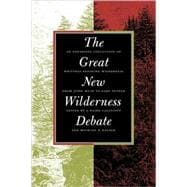
Note: Supplemental materials are not guaranteed with Rental or Used book purchases.
Purchase Benefits
What is included with this book?
| Acknowledgments | |
| Introduction | p. 1 |
| Selections from "The Images or Shadows of Divine Things," "Christian Doctrine of Original Sin Defended," and "Sinners in the Hands of an Angry God" | p. 23 |
| Selections from Nature | p. 28 |
| Selections from "Walking" and "Huckleberries" | p. 31 |
| Selections from Our National Parks | p. 48 |
| "The American Wilderness: Wilderness Hunters and Wilderness Game" | p. 63 |
| "Wilderness as a Form of Land Use" | p. 75 |
| "The Problem of the Wilderness" | p. 85 |
| "Why Wilderness?" | p. 97 |
| "Wildlife Management in the National Parks" (or, The Leopold Report) | p. 103 |
| The Wilderness Act of 1964 | p. 120 |
| "Federal Wilderness Preservation in the United States: The Preservation of Wilderness?" | p. 131 |
| "An Amalgamation of Wilderness Preservation Arguments" | p. 154 |
| "Indian Wisdom" | p. 201 |
| "The International Perspective" | p. 207 |
| "Cultural Diversity, Human Subsistence, and the National Park Ideal" | p. 217 |
| "Radical American Environmentalism and Wilderness Preservation: A Third World Critique" | p. 231 |
| "The Relevance of Deep Ecology to the Third World: Some Preliminary Comments" | p. 246 |
| "Deep Ecology Revisited" | p. 271 |
| "The Third World, Wilderness, and Deep Ecology" | p. 280 |
| "Taming the Wilderness Myth" | p. 293 |
| "Overturning the Doctrine: Indigenous People and Wilderness - Being Aboriginal in the Environmental Movement" | p. 314 |
| "The Wilderness Narrative and the Cultural Logic of Capitalism" | p. 325 |
| "The Wilderness Idea Revisited: The Sustainable Development Alternative" | p. 337 |
| "The Wilderness Idea Reaffirmed" | p. 367 |
| "That Good Old-Time Wilderness Religion" | p. 387 |
| "Wilderness Areas for Real" | p. 395 |
| "Sustainability and Wilderness" | p. 408 |
| "The Pristine Myth: The Landscape of the Americas in 1492" | p. 414 |
| "The Incarceration of Wildness: Wilderness Areas as Prisons" | p. 443 |
| "The Trouble with Wilderness, or, Getting Back to the Wrong Nature" | p. 471 |
| "Wilderness, Myth, and American Character" | p. 500 |
| Selections from "Threatened Species" and "Wilderness" | p. 513 |
| "Wilderness Recovery: Thinking Big in Restoration Ecology" | p. 521 |
| "Getting Back to the Right Nature: A Reply to Cronon's 'The Trouble with Wilderness'" | p. 540 |
| "Wilderness: From Scenery to Nature" | p. 568 |
| "Should Wilderness Areas Become Biodiversity Reserves?" | p. 585 |
| "Using Biodiversity as a Justification for Nature Protection in the US" | p. 595 |
| "In Wildness Is the Preservation of the World" | p. 617 |
| "Cultural Parallax in Viewing North American Habitats" | p. 628 |
| "The Rediscovery of Turtle Island" | p. 642 |
| "Wilderness Skepticism and Wilderness Dualism" | p. 652 |
| Index | p. 691 |
| Table of Contents provided by Blackwell. All Rights Reserved. |
The New copy of this book will include any supplemental materials advertised. Please check the title of the book to determine if it should include any access cards, study guides, lab manuals, CDs, etc.
The Used, Rental and eBook copies of this book are not guaranteed to include any supplemental materials. Typically, only the book itself is included. This is true even if the title states it includes any access cards, study guides, lab manuals, CDs, etc.